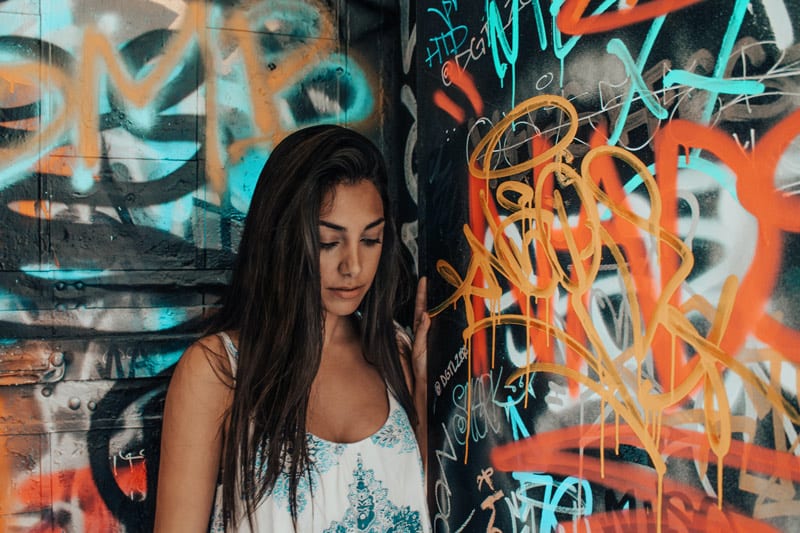I bite my tongue until it bleeds, my stomach turns to knots, and my whole body tenses up. I overthink every step I take, the clothes I wear, my make-up, every person I walk by. Am I going to use the self-checkout or talk to the clerk? What if the self-checkout freezes and I have to ask someone for help?
I take deep breaths, trying to rationalize, but my body responds before my brain can talk it down. Everything I feel is amplified. My emotions are so much more intense than most other people’s. All it takes is one wrong look from somebody, and I am incapacitated. My heart thuds faster, my throat contracts and my eyes start to burn. Waves of emotional pain physically rush through my body and build inside me, pushing at my skin, looking for escape. I look down, expecting my skin to tear, but nothing is seen. The pain is invisible.
There are signs at every corner, flashing the words “you aren’t good enough,” which reminds me of the stereotyped views put forth by the society – pretty odd and distressing because I never really saw myself through the lens of somebody else.
It makes me feel like I have been pushed off a cliff by someone I thought would hold me tight and never let go. The earth beneath me is cracking up, and I am falling into a darkness I am unable to comprehend or measure the depths of. Living with borderline personality disorder(BPD), I get absolutely tongue-tied when I have to talk about my mental health problems. Due to the stigma surrounding personality disorders, I was too embarrassed to tell anyone. I was scared I would be judged and abandoned by people, so I didn’t put it out there.
I tried exercising and doing yoga for a while, which helped me fight the illness within myself, but that didn’t change the way society saw me. Eventually, I joined a BPD support group, which was like therapy. It felt like a homecoming of sorts. I had found a space where neurodivergent people, who shared the same label and were wired similarly to me, could be themselves unabashedly without receiving flak for it. It was a space where my quirks were not only accepted but also embraced and understood.
Living with a mental health condition is far from rosy, and there are days where you do not want to be told what you need to be doing. You want to be heard, and you want to know that someone else relates to you. Therapy helped me change myself into a better person. The big changes came from speaking wholly in day-to-day conversations with myself:
- Never stop standing up for your values and for being yourself.
- Surround yourself (only) with people who believe in you.
- Celebrate every little achievement
- Being the black sheep is a sign of strength.
I still remember how my ex-best friend’s mother said: “You’re always the black sheep who brings negativity into my daughter’s life.” For me, the black sheep is the person who always stands up for her values, who tells the ugly truth and is always questioning authority.
Why pursue a superficial image that is ultimately unattainable? Why conform to society’s distorted standards? Why choose to give in and believe that you are not good enough? My world view is skewed by how other people look at me with a gleam in their eyes as if to say “Oh! Here’s the girl suffering from BPD”.
When I realized my sense of victimhood and negative thinking were self-sabotaging, I started to put my pieces together. I began to see my flaws as positive qualities and my rebellious nature as one of the most helpful strengths I have.
I began to look at and challenge my assumptions about myself, one by one. After I understood my issues more closely, I consciously tried to change the way I thought about myself and what I could do.
“You know you’re borderline when you fluctuate between fearing abandonment and encouraging it” – Jaen Wirefly, mental health blogger living with borderline personality disorder
If you or someone you know experiences mental health issues, it is important to seek help from a qualified professional. Our Resource Specialist can help you find expert mental health resources to recover in your community. Contact us now for more information on this free service to our users.
About the Author: Inchara Kakaraparthi is a budding author who writes books. She’s best known for writing autobiography. She hails from Karnataka, a south Indian state known for its heritage sites and wide range of delicacies. She’s pursuing engineering and is 19 years old. And here’s a piece of what she’s written considering what she states as- “we’re all unique and yet, still the same.”
Social Media
- Instagram: inchara_25
- Facebook: Inchara Kakaraparthi
Photo by DESIGNECOLOGIST on Unsplash
The opinions and views expressed in any guest blog post do not necessarily reflect those of www.rtor.org or its sponsor, Laurel House, Inc. The author and www.rtor.org have no affiliations with any products or services mentioned in the article or linked to therein. Guest Authors may have affiliations to products mentioned or linked to in their author bios only.
Recommended for You
- Why Eating Disorders in Men Are Often Missed - July 3, 2025
- No More Silence: The Opioid Epidemic’s Alarming Impact on Women - June 30, 2025
- The Hidden Impact of Repressed Memories on Mental Health and How to Heal - June 26, 2025





